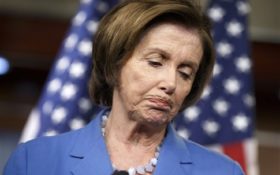President Donald Trump and House Speaker Nancy Pelosi on Thursday hardened their positions about a border wall, casting doubt on the prospects of Capitol Hill negotiations intended to reach a compromise and avoid a second government shutdown.
Pelosi repeated during the shutdown that negotiations with the White House on building the wall would only begin once the government was funded.
Now that the government is funded, Pelosi has refused to even consider funding the wall.
In a barrage of morning tweets, Trump sent demands that hardened his wall demand and suggested that repairing existing fencing is also part of his plan.
Lets just call them WALLS from now on and stop playing political games! A WALL is a WALL!
— Donald J. Trump (@realDonaldTrump) January 31, 2019
Trump on Thursday tamped down expectations, telling GOP negotiators they were “wasting their time.”
“Democrats, despite all of the evidence, proof and Caravans coming, are not going to give money to build the DESPERATELY needed WALL. I’ve got you covered. Wall is already being built, I don’t expect much help!” Trump tweeted.
Trump’s threat to unilaterally build the wall through an unprecedented use of emergency powers could upset congressional Republicans. Pelosi’s hard-line move could push the president further in that direction.
The high-stakes talks are taking place against the backdrop of another possible shutdown in mid-February. It increases the chances that the only way to avert another shutdown would be to put a host of federal agencies on autopilot for weeks or months.
Pelosi suggested she would be open to vehicle barriers called “Normandy fencing.”
“If the president wants to call that a wall, he can call that a wall. … Is there a place for enhanced fencing? Normandy fencing would work,” Pelosi said.
Democrats offered further details of their border security plan on Thursday, unveiling a measure that would not provide a penny for his wall, ignoring Trump’s warnings that they’d be wasting their time if they don’t come up with wall money.
The Democratic measure, totaling almost $22 billion for the customs service, border patrol and immigration agents, would significantly increase spending for scanners at ports of entry, humanitarian aid for apprehended illegal immigrants, and new aircraft to police the U.S.-Mexico border. It would freeze the number of border patrol agents and block any wall construction in wildlife refuges along the border.
Pelosi’s declaration promises to put a nail in Trump’s request for $5.7 billion to build about 234 miles of barriers along the U.S. border with Mexico. Trump’s GOP allies acknowledge he might have settled for just a fraction of it.
A top Democrat, House Appropriations Committee Chairwoman Nita Lowey, D-N.Y., acknowledged that “everything is on the table,” including the border barriers demanded by Trump — before that was squashed by Pelosi. Lawmakers on both sides in the talks signaled flexibility in hopes of resolving the standoff with Trump that sparked the 35-day partial government shutdown.
Republican allies of the president said there will have to be some money to meet Trump’s demands. But they also predict privately that the White House is eager to grab an agreement and declare victory — even if winning only a fraction of Trump’s request.
“The components of border security are people, technology and a barrier. And everybody has voted for all three,” said Sen. John Hoeven, R-N.D. “To get to an agreement we’ve got to have all three in there.”
But as talks on the homeland security budget open, Trump and Republicans are in a weakened position just 17 days before the government runs out of money again without a deal. Democrats won back the House in a midterm rout and prevailed over Trump in the shutdown battle.
“Smart border security is not overly reliant on physical barriers,” said Lowey as the session began Wednesday. She said the Trump administration has failed to demonstrate that physical barriers are cost effective compared with better technology and more personnel.
The comments at once served notice that Democrats weren’t ruling out financing physical structures, but would do so only on a limited basis.
The president surrendered last Friday and agreed to reopen government for three weeks so negotiators can seek a border security deal, but with no commitments for wall funds.
The Associated Press contributed to this article.
